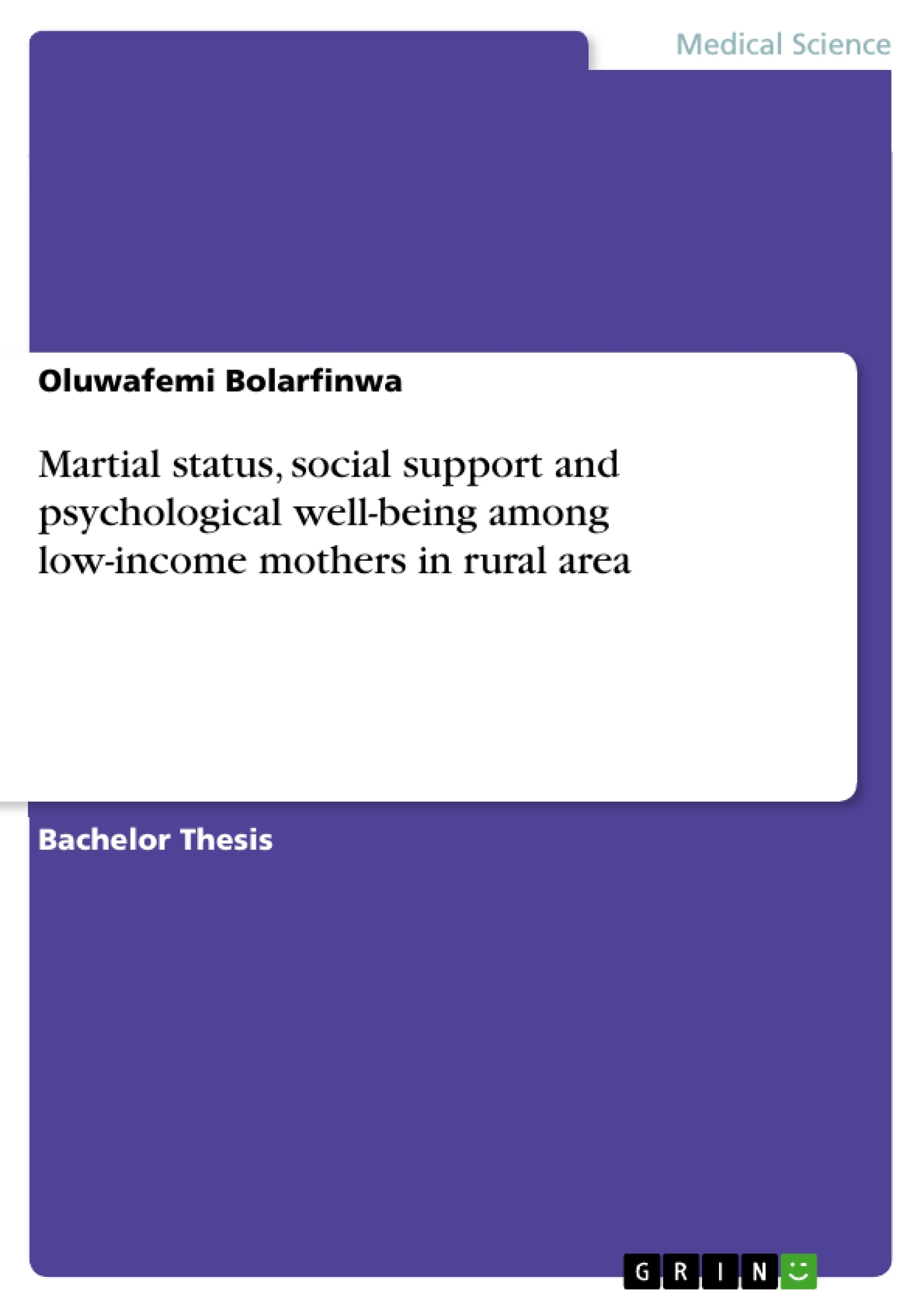This study examined the relationship between marriage, social support, and psychological health among impoverished, rural mothers. While research suggests marital status and social support are negatively correlated with depression, research investigating such relationships and effects on poor, rural mothers over time is scant.
To examine the roles of marital status, social support, and time on depression, mean comparison and analysis of variance were run for depression levels across time, categories of partnership, categories of social support, and categories of change in marital status over time. While findings revealed that marital status had little effect on depression levels, social support appeared to be negatively correlated with depression. Furthermore, mothers who maintained marital status and reported high social support reported the lowest depression levels. Findings contribute to the limited body of research focusing on health in rural areas and yield valuable knowledge about the experience of psychological health among impoverished, rural mothers.
Inhaltsverzeichnis (Table of Contents)
- CHAPTER I: Introduction
- Psychological Well-Being and Poverty.
- Psychological Well-Being and Geographic Location
- Psychological Well-Being and Race/Ethnicity.
- Problem Statement.
- CHAPTER II: Literature Review
- Marital Status and Psychological Well-being.
- Marital Status and Race/Ethnicity.
- Marital Status and Poverty.
- Married Persons and Psychological Well-Being.
- Cohabitation.
- Married vs. Non-Married Persons and Psychological Well-Being
- Social Support and Psychological Well-being.
- Social Support and Geographic Location.......
- Social Support and Race/Ethnicity.
- Social Support and Marital Status.
- Marriage as Social Support ...
- Theoretical Framework.
- Social Selection Perspective
- Family Stress Theory.
- Purpose of the Study
- CHAPTER III: Methodology.
- Sample.
- Procedures
- Measures
- Model 1
- Model 2
- Data Analysis.
- CHAPTER IV: Results.
- Demographics Characteristics.
- Descriptive Data Analyses of Variables.
- Marital Status and Depression.......
- Social Support and Depression
- Bivariate Relationships between Continuous Variables.
- Mean Comparison 1: Depression .....
- Mean Comparison 2: Marital Status and Depression........
- Mean Comparison 3: Perceived Social Support and Depression ......
- Multivariate Analysis of Variance 1: Depression.......
- Multivariate Analysis of Variance 2: Marital Status and Social Support on Depression ...
- Marital Status and Social Support on Change in Depression ...
- Mean Comparison 4 and Multivariate Analysis of Variance 3: Race on Social Support and Depression......
- CHAPTER V: Discussion
- Characteristics of Rural Mothers..........\n
- The Relationship between Marital Status and Depression.
- Marital Status vs. Partner Status
- The Relationship between Perceived Social Support and Depression .....
- The Relationship between Marital Status, Social Support, and Depression.
- The Relationship between Life Changes and Depression .......
- Race/Ethnicity.
- Summary of Findings.
- Limitations
- Future Research...
- Program and Policy Implications.
Zielsetzung und Themenschwerpunkte (Objectives and Key Themes)
This study investigates the relationship between marital status, social support, and psychological well-being among low-income mothers in rural areas. The study aims to understand how these factors influence depression levels over time, particularly among impoverished, rural mothers, a population with limited research. Key themes of the study include:- The role of marital status in influencing psychological well-being among low-income rural mothers.
- The relationship between social support and psychological well-being in the context of poverty and rural living.
- The impact of changes in marital status on depression levels.
- The role of race/ethnicity in moderating the relationship between social support and depression.
- The influence of poverty and rural location on psychological health among mothers.
Zusammenfassung der Kapitel (Chapter Summaries)
- Chapter I: Introduction introduces the concept of psychological well-being and its various dimensions, including happiness, hopefulness, and the absence of psychological distress. It discusses the factors influencing psychological well-being, such as economic stability, interpersonal relationships, and social support. The chapter also highlights the importance of geographical location and race/ethnicity in shaping these relationships.
- Chapter II: Literature Review explores the existing literature on marital status and psychological well-being, examining the impact of marital status on race/ethnicity, poverty, and overall psychological health. It delves into the role of social support in psychological well-being, considering its association with geographic location, race/ethnicity, and marital status. The chapter also introduces two theoretical frameworks: the Social Selection Perspective and Family Stress Theory, which help to explain the link between social factors and psychological well-being.
- Chapter III: Methodology describes the methodology used in the study, including the sample selection, data collection procedures, and measures employed to assess marital status, social support, and depression. The chapter also outlines the statistical models and data analysis methods used to examine the relationships between the variables.
- Chapter IV: Results presents the findings of the study, analyzing the demographic characteristics of the participants, the relationship between marital status and depression, and the impact of social support on depression levels. The chapter also explores the bivariate relationships between continuous variables and utilizes mean comparison and multivariate analysis of variance to assess the influence of marital status, social support, and race on depression.
Schlüsselwörter (Keywords)
This study focuses on the intersection of marital status, social support, and psychological well-being, particularly among low-income mothers residing in rural areas. It examines the impact of these factors on depression levels and seeks to identify the influence of race/ethnicity on the relationship between social support and depression. The key terms and concepts include marital status, social support, psychological well-being, depression, poverty, rural location, race/ethnicity, and mean comparison, multivariate analysis of variance. These keywords encapsulate the study's primary focus on understanding the multifaceted challenges and resilience of impoverished, rural mothers.- Quote paper
- Oluwafemi Bolarfinwa (Author), 2009, Martial status, social support and psychological well-being among low-income mothers in rural area, Munich, GRIN Verlag, https://www.grin.com/document/174837




